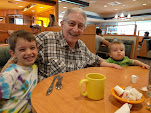Dear Dr. King
I’m embarrassed to trivialize your experience by likening mine to it, but I’ve had a taste of what it’s like to be the victim of prejudice and discrimination and I hate it! It’s so unfair! It’s so painful! It’s so evil and destructive! Even the petty scale on which I’ve been subjected to such injustice has filled me with a vindictive anger that often seems beyond my control, and I remember you today with awe and wonder at how you were able to respond to such profound hatred and bigotry with the Christ-like spirit you did.
I was a senior in high school nearing graduation the day you were assassinated. I must confess that your murder did not unsettle me the same way that President Kennedy’s did five years earlier, or even to the same degree his brother’s did two months after yours the week of my graduation. I grew up in the proverbial lily-white suburb that was safely sheltered from people of color, ethnicity, and Democrats. It was necessary to drive to another part of the city to view your kind, and I wasn’t really so sure but what you had brought on your own demise by your insistence upon upsetting the status quo.
One of the most significant aspects of my “higher education” was moving into the college dorm where two supposed Black Panthers from Omaha lived across the hallway. In retrospect, I’m not sure that Beau and Teddy were any more genuine militants than I was the Goldwater Republican I fancied myself to be, but it was from the phonograph in their room that I first began to really pay attention to what you were saying in your speeches. Those were years that my “eyes were opened” and my “consciousness was raised” to all sorts of things, not the least of which was a whole new appreciation for your profound words: “I have a dream…”
Our world has been deprived of knowing your thoughts on what has happened to that dream over the last forty years. One would hope that part of it has been realized, while it is painfully obvious that much of it remains just that, a dream. When you accepted your Nobel Peace Prize, you said:
“Nonviolence is the answer to the crucial political and moral questions of our time; the need for man to overcome oppression and violence without resorting to oppression and violence.
“Man must evolve for all human conflict a method which rejects revenge, aggression and retaliation. The foundation of such a method is love.”
I think I understand why so many were offended when President Bush hypocritically placed a wreath upon your grave. We have been left with your words, but not with your comprehension.
How I wish I could spend some time learning from you your theology and Christology. What were you able to understand about Jesus’ life and teachings that seem so elusive to the rest of us? Your belief that “unearned suffering is redemptive”; that “injustice anywhere is a threat to justice everywhere”; and that “if a man hasn’t discovered something that he will die for, he isn’t fit to live” is unfortunately just as contrary to contemporary mainstream thought as it was when you articulated your vision for the future.
We’re still sold on the “might makes right” paradigm, and to maintain our “superiority” through domination and oppression – even if it is violent and destructive – still somehow makes sense to us. Just as you were expected to “know your place” in the mid-twentieth century, we have embarked upon this new millennium expecting the whole world to know that our place is Number One. I’m guessing that even you might be astonished by the claim God has ordained such a worldview and the leadership to carry it out.
You grasped the concept that humility needs to displace the obsession with superiority and domination before love can truly take root and blossom. Love and arrogance are the oil and water of our times, and on this day that we have labored to set aside in your honor we need to try harder to understand how you managed to remain humble while at the same time recognizing the righteousness of your calling. I want to know the inner peace that empowered you to say on your last night with us:
“I just want to do God’s will. And He’s allowed me to go to the mountain. And I’ve looked over, and I’ve seen the promised land…So I’m happy tonight. I’m not worried about anything. I’m not fearing any man.” Amen.

